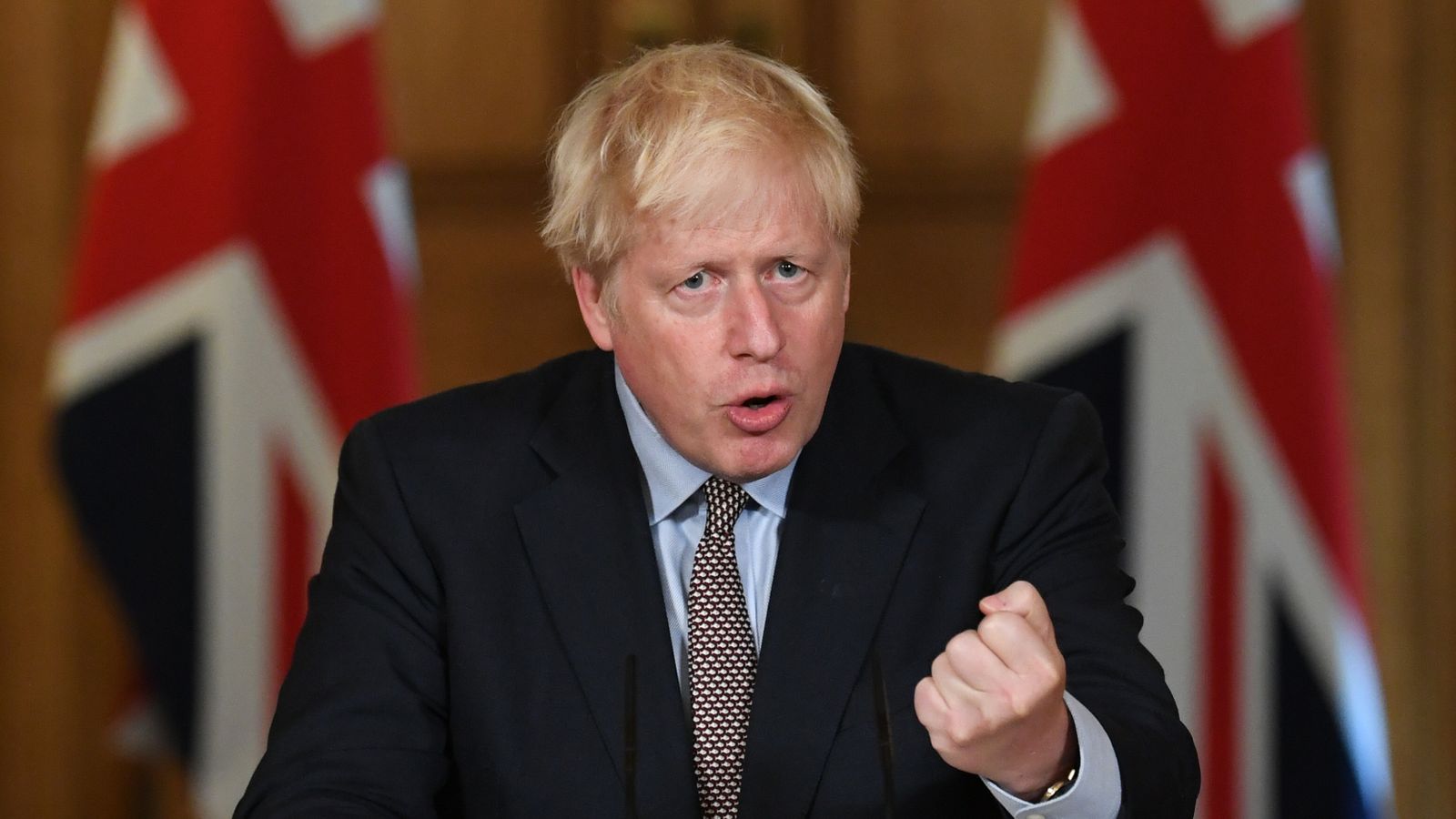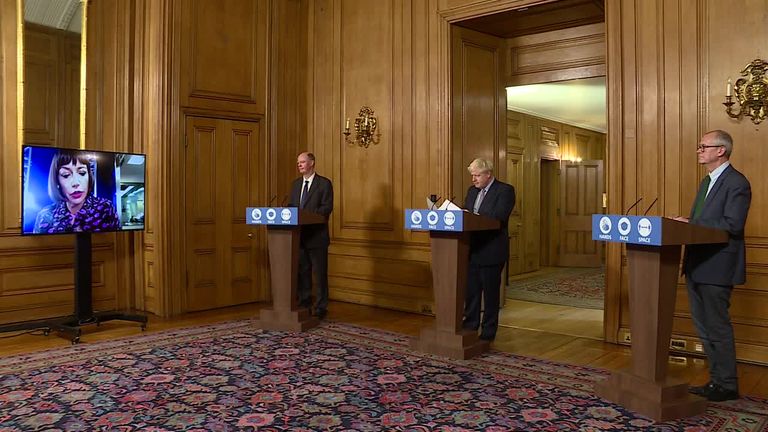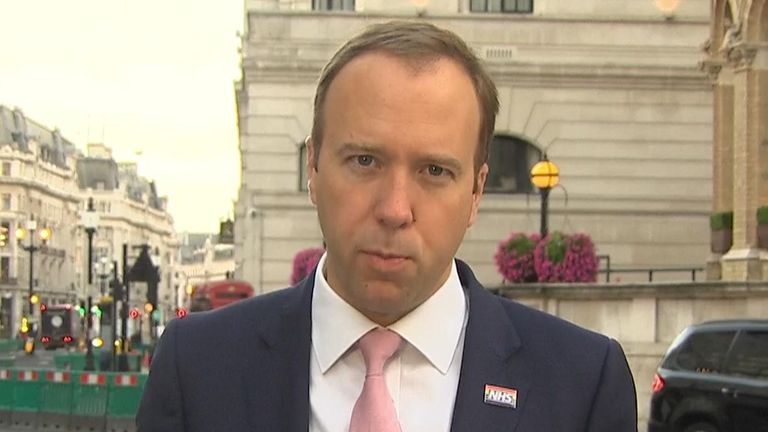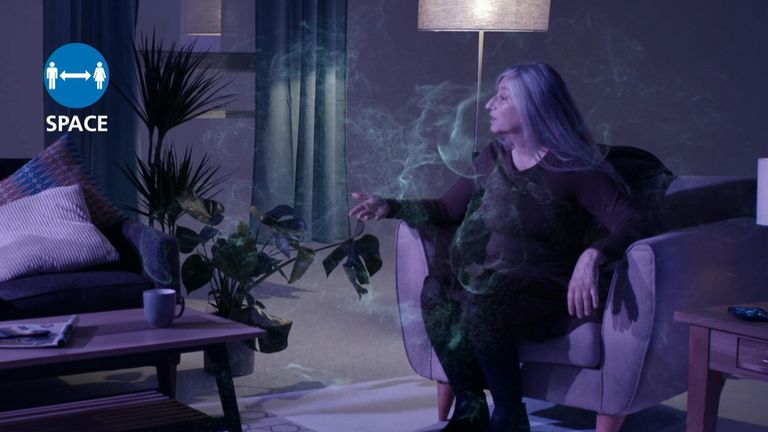Boris Johnson has urged people to limit social contact as much as possible, as he confirmed a ban on gatherings of more than six individuals in England will come into force from Monday.
Speaking at a Downing Street news conference, the prime minister admitted the coronavirus rules had become “complicated and confusing”.
He said this latest move, the biggest crackdown since the COVID-19 lockdown was eased earlier this summer, was aimed at “simplifying and strengthening the rules” and “making them easier for everyone to understand”.
“You must not meet socially in groups of more than six,” Mr Johnson said, with the PM adding that it “breaks my heart” to have to bring in the restrictions.
He added: “The ban will be set out in law and it will be enforced by the police – anyone breaking the rules risks being dispersed, fined and possibly arrested.”
The ban will apply to indoor and outdoor gatherings, including private homes, parks, pubs and restaurants.
Gatherings will still be allowed where the household or support bubble is larger than six, or where gathering is for work or education.
Weddings, funerals and organised team sports will also be exempt.
The PM said “COVID-secure” venues like places of worship, gyms, restaurants and hospitality venues will still be able to hold more than six people in total.
But within those venues, there must not be individual groups larger than six and groups cannot mix socially or form larger groups.
The “rule of six” will be kept under “constant review”, Mr Johnson said, and the government will “only keep it in place as long as is necessary”.
He said the new rules were being put in place to “prevent another wholesale national lockdown”.
Looking to the future, Mr Johnson spoke about his ambition for there to be mass testing of the population to allow a return to a more normal life.
Asked by Sky News’ political editor Beth Rigby whether without a mass testing regime in place people should accept having smaller gatherings at Christmas, the PM said “it is just too early to say”.
However, he said he is “hopeful” the new rules will get the current spike down.
Labour leader Sir Keir Starmer said: “We do support the measures that the government have put in place and we would urge the public to comply with the new rules.”
“I think the government’s now acknowledged that their poor communications were a large part of the problem so that’s got to be fixed,” he added.
“But they also need to recognise that the testing regime is all over the place at the moment.
In Scotland, up to eight people from three households are allowed to meet indoors, while groups of 15 people – from up to five households – are permitted to meet outdoors.
In Wales, up to 30 people can meet outdoors but people have been told not to gather indoors with anyone who is not a member of their household (or extended household) “unless they have a good reason”.
Up to four households, with an unlimited number of people, are able to join together to form an “extended household” in Wales.
In Northern Ireland, six people from two different households can meet indoors and groups of up to 15 people outdoors.
The PM also revealed:
- Social premises and venues, including pubs and restaurants, will now be legally required to request test and trace information from customers and keep details for 21 days
- Marshals will be drafted in to help ensure social distancing is maintained in town and city centres
- Border Force will be stepping up the enforcement of quarantine rules for travellers into the country
- Pilots of sports and entertainment events will be be reviewed
- The government is “working hard” to increase testing capacity to 500,000 a day
- New guidance will be issued to universities on how they can remain open to students in a “COVID-secure” way
On his ambitious “moonshot” plan on testing, he said: “We want to start using testing to identify people who are negative – who don’t have coronavirus and who are not infectious – so we can allow them to behave in a more normal way, in the knowledge they cannot infect anyone else with the virus.”
Prior to the PM’s address, England’s Chief Medical Officer, Professor Chris Whitty, said the number of cases was “going up sharply” in the 20-29 and 30-39 age groups.
It comes after the number of daily positive coronavirus cases in the UK rose to almost 3,000 – figures not seen since May.
A total of 2,659 lab-confirmed cases were reported in the UK on Wednesday, following on from 2,460 on Tuesday, 2,948 on Monday and 2,988 on Sunday.
Presenting data from other European countries, Prof Whitty said it was vital to act “rapidly and decisively” when cases rise.
He warned that the period between now and spring will be “difficult”, adding: “I think in terms of the existing restrictions, people should see this as the next block of time that may not last for many months, but it is very unlikely to be over in just two or three weeks.
“So I think that there’s a block of time and at that point we will collectively as a nation have to look again at where things are and work out what are the right things to do.”
ANALYSIS: New restrictions – and an exit plan that looks a way off
By Kate McCann, political correspondent
The idea of a team of COVID-secure marshals patrolling towns and cities around England to ensure people keep their distance would have been unimaginable just a few months ago.
But today Boris Johnson announced this and a host of other new rules designed to crack down on an increase in COVID-19 cases just as the country prepares to hunker down for winter.
Mr Johnson and his scientific advisers know this is the most dangerous moment for the country as people return to work and school, spend more time indoors and grow tired of having to stay apart from friends and family.
They also know they need to act quickly and decisively to try and change the course of the spread before it is too late.
Cutting the number of people who can meet to just six, indoors and out, making it compulsory to hand over contact details when you visit a bar or restaurant and toughening up measures at the border are all part of this plan.
But the prime minister also gave a hint of his exit strategy to free the country of the measures he so desperately wishes he didn’t have to impose.
Mass public testing on a huge scale could, Mr Johnson said, allow people without the virus to live their lives as normal. A pilot will start in Salford next month, testing people at indoor and outdoor events to allow those without the virus to attend as normal and weed out those who are infectious.
However, the technology, distribution network and means to deliver such an ambitious plan is a long way off.
The prime minister clearly wishes he didn’t have to introduce new tougher measures, he knows people will be less receptive to staying apart the second time around.
“Of course I don’t feel comfortable [introducing this],” he told viewers, “It breaks my heart to have to insist on these restrictions upon individuals, upon families.”
“But those inside Number 10 fear if these new measures are ignored a much broader lockdown could be on the way to protect the most vulnerable this winter.”




